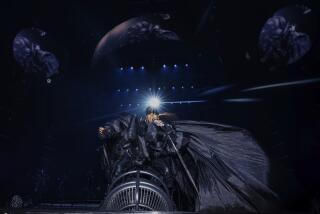Such Sweet Reissues: A Quartet of Ducal Delights
- Share via
DUKE ELLINGTON AND HIS ORCHESTRA
“Such Sweet Thunder”
“Black, Brown & Beige”
“Anatomy of a Murder”
Columbia Legacy
* * * *
DUKE ELLINGTON AND COUNT BASIE AND THEIR ORCHESTRAS
“First Time! The Count Meets the Duke”
Columbia Legacy
* * * *
This largely underappreciated group of recordings, issued in the 1956-62 period, represent the initial outpouring of what will eventually become a rush of Ellington reissues. Scheduled for release on April 27, two days before the legendary composer-bandleader’s birthday centennial, they chronicle the diverse range of activities occupying Ellington, co-arranger and co-composer Billy Strayhorn and the orchestra at this mature and accomplished stage in their collective careers.
“Such Sweet Thunder” is an astonishingly ambitious undertaking, an effort to grasp the complex, multileveled emotional and dramatic textures of Shakespeare in a group of musical compositions. And even more astonishing is the fact that Ellington (and Strayhorn) manage to do so with such success. The pieces encompass views of “Othello,” “Henry V” (in “Sonnet to Hank Cinq”), “Macbeth,” “Hamlet” and others, often in the form of musical sonnets. (Reportedly, according to scholar Bill Dobbins, who assisted in transcribing the work for a Lincoln Center concert, the Ellington variations include 14 phrases of 10 notes each, reflecting Shakespeare’s use of 14 lines of iambic pentameter.)
“To appreciate the suite in its final form,” wrote Irving Townsend, the album producer, “one must listen to the music as a statement of what Duke got out of Shakespeare, a uniquely personal, yet deeply perceptive encounter. . . . Duke liked Lady Macbeth . . . and he treats her right.” As he does the balance of the Shakespeare characters.
In addition to the tracks originally released, the CD adds 10 items previously unissued or unavailable in the U.S., and the album is in stereo for the first time.
“Black, Brown & Beige” surely deserves to be listed among the top items in Ellington’s masterworks. Originally debuted in 1943 at Carnegie Hall, it received surprisingly critical reviews at the time. Although a full-length version of that performance has been released, Ellington never quite stopped tinkering with the work, and offered a different perspective in this 1958 studio version.
Its most memorable aspect, for many listeners, is the stunning rendition of “Come Sunday” by gospel singer Mahalia Jackson. But the division of the work into six segments, and the absence of alto saxophonist Johnny Hodges, gives it a considerably different slant from the sparkling originality of the original version. There are added benefits, however, in Jackson’s lovely rendering of the 23rd Psalm. This version also includes a number of fascinating outtakes--most notably Jackson’s a cappella version of “Come Sunday,” reportedly, according to producer Townsend, sung in a darkened studio at Ellington’s request.
“Anatomy of a Murder,” written for the 1959 Otto Preminger film, has been considered by some critics to be a less consequential Ellington-Strayhorn effort. But perspective is important here, as it is in the case of all film music, which necessarily serves a relatively specific purpose. And what is fascinating about the Ellington-Strayhorn score is the extent to which it served the needs of the picture without compromising either the identity of the orchestra or the creativity of the music.
This release removes the artificial reverb in the original LP, includes a number of unissued takes (including a wonderfully witty sendup of Guy Lombardo), and both mono and stereo (previously unreleased) versions of the “Anatomy of a Murder” single.
The Ellington-Basie encounter is everything one might expect it to be, despite the clear differences in rhythmic emphasis and collective textures between the two ensembles. Often, the blend between them doesn’t quite get into sync, and stories have circulated for years regarding a variety of difficulties and encounters that arose during the album’s recording. (They included an encounter between two Ellington members--trumpeter “Cat” Anderson and volatile valve trombonist Juan Tizol--that resulted in Tizol’s resignation from the orchestra; and Basie’s refusal to play on the Ellington theme “Take the ‘A’ Train,” resulting in composer Strayhorn’s sitting in his place.)
All this aside, the music is rare and wonderful--neither trademark Basie nor typical Ellington, but something in between, a linkage between two of the arguably most important large ensembles in jazz history.
*
Albums are rated on a scale of one star (poor), two stars (fair), three stars (good), four stars (excellent).
More to Read
The biggest entertainment stories
Get our big stories about Hollywood, film, television, music, arts, culture and more right in your inbox as soon as they publish.
You may occasionally receive promotional content from the Los Angeles Times.










